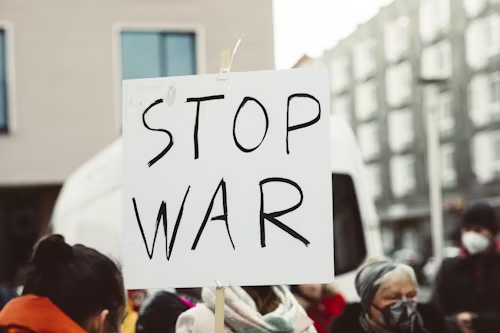Russia aims to keep NATO’s attention fixed on Ukraine, hiding its larger imperialist ambitions, writes Matas Maldeikis. Lithuania remains a key supporter of Ukraine, ranking among NATO’s top three donors relative to GDP. Aware of Russia’s threat, Lithuanians understand the high stakes involved.
Since the Soviet Union’s collapse, Russia’s authoritarian grip has tightened under Vladimir Putin. His core objectives are clear: disrupt, expand, and influence. This strategy extends beyond Europe, reaching into the “Global South.” By pressuring these nations, Putin seeks to weaken their ties with the West. The goal is to create diplomatic fractures, reduce global opposition to his actions in Ukraine, and build alliances with Russian-aligned states.
Libya: A Key Example
Libya is a crucial example of Russia’s strategy. It serves as a gateway for influence in sub-Saharan Africa. Since Muammar Gaddafi’s fall in 2011, Libya’s attempt at stable democracy has faltered. Rival governments and warlords now compete for control over its valuable oil and gas resources.
Russia has exploited Libya’s instability, forming strong ties with General Khalifa Haftar. Haftar’s Libyan National Army (LNA) has received Russian backing. Russia’s goal is clear: establish a client state under Haftar’s rule. To achieve this, Russia supports illicit activities like fuel smuggling and illegal currency printing. Military cooperation is also on the table, with discussions about creating a Russian naval base in Tobruk.
This poses serious risks to European energy security and Mediterranean stability. Control of Libya’s energy assets could give Russia leverage over Europe’s energy policies. Libya’s location is strategic, lying close to southern European nations like Italy and Spain. Additionally, Libya’s role as a migration departure point could trigger new waves of migration toward Europe if conflict escalates.
Spreading Influence Through Chaos
Libya’s instability allows Russia to deploy mercenaries and expand influence across Africa. Countries like Sudan and Mali have already experienced the fallout. Russian fighters operate alongside local militias and rebel groups. The result has been military takeovers in nations like Niger and Mali, where new governments distance themselves from Ukraine.
To solidify his control, Putin targets Libya’s key institutions. The National Oil Corporation (NOC), led by Chairman Ferhat Bengdara, faces ongoing corruption issues. Billions of dollars in public funds remain unaccounted for, hampering Libya’s essential oil sector. Haftar’s forces continue to disrupt oil production, blocking vital fields like El Sharara. These blockades create uncertainty for European energy supplies, with the NOC’s allies providing little effective response.
As Haftar’s influence grows, Libya’s fate as a potential Russian vassal state becomes more likely. The consequences for Europe’s energy security and geopolitical stability are profound.
A Unified NATO Response is Essential
NATO’s unity is crucial to counter Russia’s growing influence in Libya and beyond. Addressing threats to energy security requires a collective approach. A firm NATO stance ensures Russia feels the full impact of international sanctions. Supporting Ukraine’s resistance remains essential, as a divided NATO would only embolden Putin’s broader ambitions.
